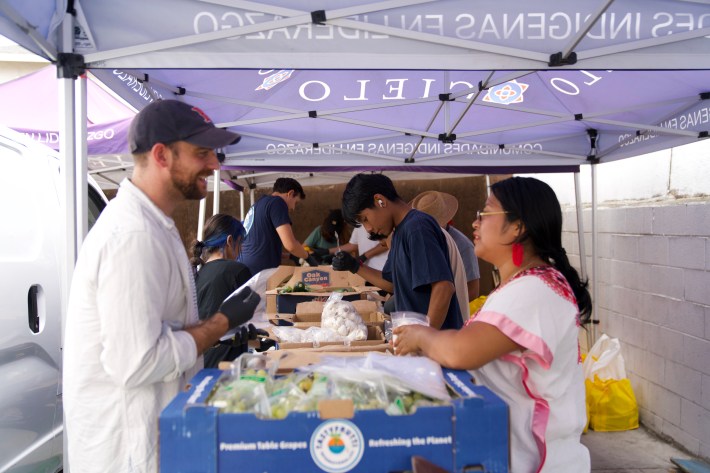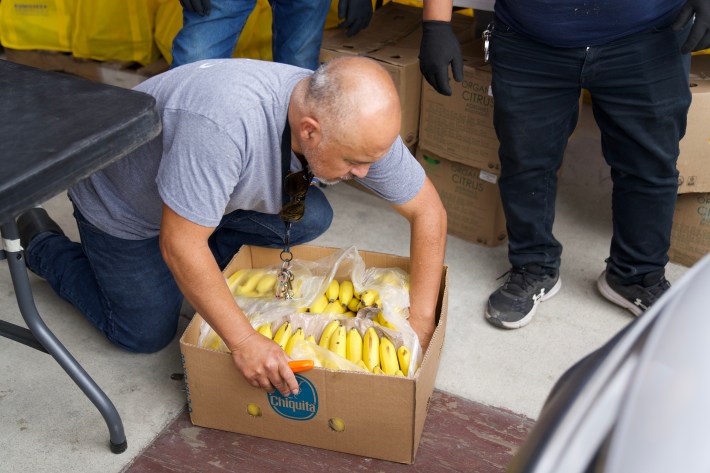When the ICE raids first started happening in L.A., the distress got to me in an almost-paralyzing way, especially as a 17-year-old, third-generation Zapoteca in Los Angeles.
In the past two months, we have seen a stark transition in our communities. At one time, a bus ride to school or a commute to work would not have caused the panic and fear it does now. With ICE on our streets now, people think twice about leaving their homes. It’s immobilizing for both those directly and indirectly affected. Watching communities, families, and friends living in fear can be incredibly distressing.
However, one thing has helped me stay focused and find strength, aside from taking to the streets in protest and volunteering my time to my communities. I did this by becoming a volunteer for CIELO, the organization my mother, Janet Martinez, and grandmother, Odilia Romero, started.
 CIELO volunteers building boxes full of culturally meaningful food. Photo by Biani Martinez for L.A. TACO.
CIELO volunteers building boxes full of culturally meaningful food. Photo by Biani Martinez for L.A. TACO.
CIELO (Comunidades Indígenas en Liderazgo) is a non-profit that focuses on serving Indigenous migrant communities. Recently, they have adapted to help those affected by the recent influx of ICE agents by delivering food boxes and setting up a solidarity aid fund where they have placed seventy thousand dollars in the hands of those affected by the raids.
CIELO is for the people and therefore backed by the people. Much of the food box delivery and packing is done with the help of volunteers.
Volunteering, I have participated in various activities, such as packing beans, counting tomatoes, or delivering food boxes; each piece works in tandem, and allows for great things to happen. The best part of it is how so many different people volunteer, creating a strong community and a fun time. It has allowed me to make acquaintances with many people.
 A volunteer at CIELO crouches down to get some bananas ready to donate. Photo by Biani Martinez for L.A. TACO.
A volunteer at CIELO crouches down to get some bananas ready to donate. Photo by Biani Martinez for L.A. TACO.
Whether it be the sixty-year-old Mayan man with a great sense of humor and a love for conversation, or two Zapotec brothers that are always in charge of the music and always play at least one jarabe, even if they’re also Smith fans, or even the freshly graduated Oaxacan boy who isn’t a hundred percent sure what town he’s from but knows that his community and CIELO has helped him, therefore he pushes to help.
When asked why these volunteers do what they do, their responses vary. For the older crowd, it’s a place of community where they find many meaningful conversations in their native languages. For the younger crowd, it is a painless way to complete mandatory community hours for school. And somewhere in the middle, the thirty-somethings find it empowering to do a little something for their communities.
While at first glance, these volunteers may seem like an odd bunch, they all fit together perfectly.
What really brings all these people together is the strong community that is built while volunteering, and the help they are able to give at the same time. In this case, it means spending our time together packing bags full of produce and pantry items that will later be delivered to people waiting in their homes.
Another part of volunteering I experience is taking these bags and boxes to people’s homes, a tradition I have adopted with a CIELO staff member, Aurora Pedro, who primarily speaks Q’anjob’al, Akateko, and English.
We spend our time calling and driving around to different homes. Meeting Indigenous families at their doors, where we are greeted with warmth, kindness, and gratitude. Oftentimes, even as excited as they are to be welcomed in Q’anjobal by Aurora and share their worries, they are able to be heard and understood more clearly in their native language.
Something that allows me to see the impact of my actions, how even if it’s just packing up some produce, your effort for your community is incredibly important. Important for people like the family of seven watched over by a single father, or the woman who recently had her husband detained, or even a mother of four who always has the cutest baby strapped to her back whenever she comes out to get her food box.
These people are part of my community and are people I have been able to help, even if it was just counting tomatoes or carrying a bag of chicken to their doorsteps. All that being said, even when things feel hopeless, scary, and distressing, it is important to focus on what you can do and start where you are.
